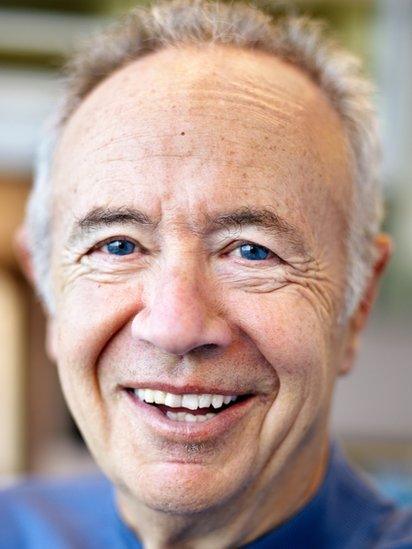Former Intel chief Andrew Grove dies aged 79
- Published

Andrew Grove, one of the architects of semiconductor giant Intel's success, has died aged 79.
Mr Grove was the third employee at Intel and one of the leaders of its engineering team.
He helped the company move from making memory chips to processors, a decision that let to its dominance in the supply of chips powering PCs.
He served as chief executive of Intel from 1987 to 1998 and then became chairman of its board until 2005.
Chip switch
Born Andras Grof in Budapest, Hungary, he emigrated to the US in 1956 aged 20 after living through Nazi persecution, a Soviet siege, repression under different Communist regimes and the crushing of a popular uprising.
In the US, he taught himself English at the same time as he studied chemical engineering, earning a doctorate in the subject in 1963.
Intel's Andrew Grove interviewed in 1982
Straight after, he joined Fairchild Semiconductor and formed friendships with Gordon Moore and Robert Noyce.
Mr Grove joined the pair in 1968 when they left Fairchild to set up Intel, becoming the third employee at the fledgling semiconductor maker.
Mr Grove was director of engineering at Intel, initially overseeing its production of memory chips.
He was instrumental in changing this manufacturing focus in the late 1970s in response to growing competition and ongoing production problems.
He switched the company to making processors for the first microcomputers and negotiated with IBM to ensure it used only Intel chips in its personal computers.
This helped establish the x86 line of processors that are synonymous with the rise of the PC.
This strategy shift helped Intel's revenues rise from $1.9bn (£1.33bn) to more than $26bn.
He was in charge of Intel in 1994 when a bug was found in the way some Pentium processors handled numbers used in some complicated calculations.
Intel brushed off initial reports of the bug saying most people would never encounter it. However, a public outcry over the bug forced it to recall all affected processors. The cost of the recall cost Intel about $475m.
Mr Grove was also known for his painstaking management style, which helped to establish the internal culture of Intel.
"He combined the analytic approach of a scientist with an ability to engage others in honest and deep conversation, which sustained Intel's success over a period that saw the rise of the personal computer, the internet and Silicon Valley," said Intel chairman Andy Bryant in a statement.
Intel was "deeply saddened" by Mr Grove's passing, said current chief executive Bryan Krzanich.
Mr Grove stepped down from his role as chief executive in 1998 as he was being treated for prostate cancer. He remained as Intel's chairman until 2005.
Intel has not given any details of what brought about his death. However, it is known that Mr Grove was diagnosed with Parkinson's disease in 2000.
Mr Grove is survived by his wife, Eva, to whom he was married for 58 years, their two children and eight grandchildren.
- Published21 August 2013
- Published15 January 2016
- Published6 January 2016
- Published4 January 2016
- Published2 September 2015